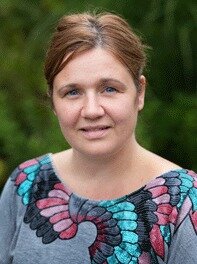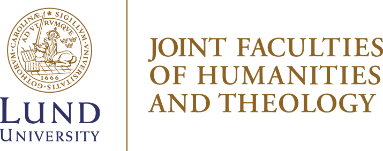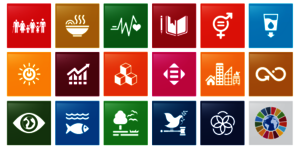Internationalisation for employees – two goal-related projects
Joint Faculties of Humanities and Theology
During the period 2019–2021, Lund University conducted a number of projects within the framework of the Action Plan for Internationalisation. Some of the projects had a clear link to the theme of internationalisation for staff.
Two interesting goal-related projects
Lund University developed an action plan for internationalisation for the period 2019–2021. Overall goals were set, and a number of goal-related projects were conducted for each of these. One of the four overall goals was: “Employees shall have good international experience and intercultural competence”. Here we interview two project managers, both of whom developed interesting proposals regarding internationalisation for employees.

Hello Hege. Would you please introduce yourself and tell us what you work with?
I currently work as a researcher in the history of religions at the Centre for Theology and Religious Studies (CTR), but when I conducted the investigation work for the Action Plan for Internationalisation, I was working as a training manager at the Joint Faculties of Humanities and Theology.
You were responsible for one of the goal-related projects under LU's Action Plan for Internationalisation (2019–2021). Which goal and why is it so important?
I was responsible for goal 4.7: Courses in intercultural communication for staff. It was important to conduct the investigation because there is no clear offer of training in intercultural communication for staff and because there is no comprehensive information on the needs for such training among LU staff.
How did you go about your mapping and investigation?
I mapped the availability of intercultural communication training through the Kompetensportalen training portal and in consultation with representatives from HR and the University's pedagogical units, and discussed the need for training with management staff in all faculties at LU.
What were the main findings you presented in the goal report?
An important finding is that training in intercultural communication should be organised so that it can serve as a forum that brings together foreign and Swedish staff. This is key, as interculturality should not be seen as merely the integration of foreign staff into the Swedish university culture, but also joint reflections on the norms and conventions of the university culture.
Another important finding is that intercultural communication should be integrated into existing continuing professional development programmes and adapted to the roles that the training is aimed at. Examples of this are management and leadership training programmes, supervisor training programmes and recruitment-related training.
What do you think LU should focus more on in this area?
Integrating reflections on interculturality and the norms and conventions of the Swedish university system into existing continuing professional development programmes provides a much more systematic and unified focus on these issues than what is needed to create a new isolated course on interculturality. Given the diversity of the staff and students at Lund University, it is reasonable for these matters to be represented in the continuing professional development programmes that already exist and are increasingly being developed.
“Within the project, intercultural communication has been defined as a communicative skill with a focus on being able to communicate in an inclusive way with students, staff and external audiences from different backgrounds. It includes awareness of one's own norms, conventions and biases.” (page 1)
“There is a broad consensus in the faculties that intercultural communication is a skill set that needs to be developed in the university organisation. The purpose and application of this skill set seems to lie in the reciprocal processes involved in the integration of newly hired foreign staff. It is a matter of both enabling foreign staff to understand and participate in the Swedish and “Lundian” university culture and encouraging staff who are already well integrated to reflect on the dominant norms, conventions and biases of the university culture. Continuing professional development in intercultural communication therefore needs to be organised so that it can function as a forum that brings foreign and Swedish staff together.” (page 2)

Hello Ellen. Would you please introduce yourself and tell us what you work with?
I am a HR Specialist at the HR Division, and work primarily as an expert in the Discrimination Act and gender equality and equal opportunities issues. I also work on the development of Lund University's performance appraisal process.
You were responsible for one of the goal-related projects under LU's Action Plan for Internationalisation (2019–2021). Which goal and why is it so important?
Yes, that is correct. I was responsible for goal-related project 4.8 which was also a project within the frames of the first HR Excellence action plan. The project was about improving the reception of international staff and developing an introduction process for new employees at Lund University. This is important because a professional reception and introduction makes employees feel more comfortable in the workplace and thus perform better in their professional role and stay longer with the same employer. It is also positive for Lund University's reputation that we are an employer that makes our international staff feel welcome.
How did you go about your mapping and investigation?
The early days were spent forming my project group (Mia Hedin, HR Administrator; Therese Oppliger, former HR Coordinator at MAXIV, Eva Westin, Administrative Director at the Department of Automatic Control at LTH, and Karin Fälth, HR Specialist) and having discussions with various groups relevant to the goal-related project, such as the doctoral education network, Future Faculty at the Faculty of Medicine, HR partners and HR administrators at the Faculty of Social Sciences, and the trade unions. We also organised three reference groups for the project, who provided valuable input and different perspectives. We then made an inventory of existing material at Lund University and realised that there was a lot of material but that it needed to be developed. Then came the major work of revising and clarifying the reception and introduction process.
What were the most important results you presented in the goal report?
The most important results were the reception process for international staff and the work to better define the process. This was because there was a perceived high demand for support from the organisations. We spent a lot of time mapping the process, making it as detailed as possible and clarifying who does what in the process. However, the process is continuously in need of revision and updating as this is an area where, for example, new interpretations of laws and decisions often occur, which creates a need to change working methods within the context of the process. We also created a Welcome Guide aimed directly at our international staff, material that has been requested by both the organisations and new international employees. Unfortunately, some of the information in the Welcome Guide is already in need of revision, something that my colleague Karin Fälth will continue to work on. We have also created two short information videos that form part of our new staff introduction programme. The videos deal with the topics Routes to Decision-Making at Lund University and Economics at Lund University (both with Swedish subtitles), short and easily accessible information for both new and less new staff.
In this area, what do you think LU should focus more on?
I think Lund University should investigate the possibility of establishing a division or group in University Administration, preferably in the External Relations Section, which works to coordinate the reception of international staff, similar to the service we provide to incoming international students. Although the support to managers and administrators in our organisations has improved through the deliverables of the goal-related project, many of our international staff lack a more personal reception, someone to call and ask questions or to visit on campus and ask questions. Many also expressed a need for a social context for international staff. It is challenging to move to a new country, and different types of social activities would make it easier for the person to get settled after the move and ultimately contribute to increased well-being among international staff at Lund University.


